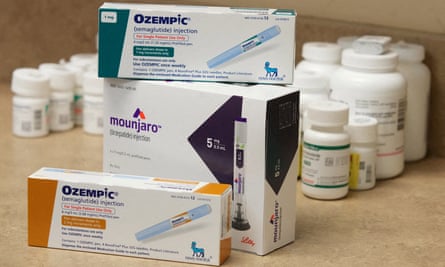‘My alcohol intake has plummeted,” says Hannah. “Since taking Wegovy I hardly ever crave a drink when I get home. When I used to go out with friends, I was nearly always the last one standing; now I’m leaving two hours before closing.”
In her early 30s, the Londoner is among the rapidly growing number of people turning to weight loss injections such as Wegovy and Mounjaro. The results have been dramatic – she has shed four stone (25kg) in little over six months.
Wider usage of these “skinny jabs” could reverberate through the business world. While runaway demand will boost sectors such as biotech (analysts think the therapies made by firms such as Eli Lilly and Novo Nordisk will be a $100bn (£82bn) global market by 2033), it could deal a blow to others – notably food, drink, retail and leisure – if customers live more abstemious lives.
The potential for upheaval was highlighted this month when Terry Smith, one of the UK’s best-known stock pickers, revealed his investment fund had offloaded its stake in Diageo, the FTSE 100 drinks company, partly because he thought these drugs threatened to depress alcohol sales in the longer run.
Smith, who runs the Fundsmith Equity fund, told shareholders in his annual letter that the drinks sector “is in the early stages of being impacted negatively by weight loss drugs”. “Indeed, it seems likely that the drugs will eventually be used to treat alcoholism, such is their effect on consumption,” he added.
Diageo, the company behind big names including Johnnie Walker, Tanqueray and Baileys, did not comment on Smith’s share sale but its chief executive, Debra Crew, is likely to face questions on the topic, and wider strategy, when it updates investors on half-year sales on 4 February. She is also likely to be asked about speculation Diageo is considering a sale or spin-off of Guinness.
A number of studies have found people who take medications such as semaglutide – the active ingredient in both Wegovy and the type 2 diabetes jab Ozempic – or tirzepatide, which is the active ingredient in Mounjaro, often report a reduction in their alcohol consumption. Further research has suggested these and related drugs might also help people with drug or alcohol addictions, as well as those with compulsive shopping or smoking habits. While experts are still unpicking why the medications might affect alcohol consumption, one possibility is that they dampen reward pathways in the brain.

Hannah was one of more than 70 readers who shared their experiences after we asked if being on weight loss medication affected the way they drank alcohol. All reported cutting back, including erstwhile heavy drinkers who had given up binges.
“I don’t get a buzz, and I feel cranky afterwards, so … why bother?” said one 59-year-old woman. “I’m also less interested in coffee, shopping and other things that used to give me little hits of dopamine.”
Some told us the jabs made them queasy and alcohol made that worse. Others reported even a small amount of alcohol produced the mother of all hangovers. However, the main theme was one of joy at conquering often-lifelong battles with weight.
“I think one of reasons I’ve cut back is that I feel the hangovers much more acutely,” adds Hannah, who works for a music venue. “I also can’t consume fizzy alcoholic drinks without feeling nauseous.”
Now, with a “cupboard full of bottles gathering dust”, she has cancelled her wine and gin club memberships. “Not going out as much and cancelling my subscriptions has more than covered the cost of the drug,” she says. “I spent £6,000 in 2023 on going out, £3,000 in 2024.” She pays for a private prescription and has spent £1,500 on the drug since June 2024.
Carla Greer, a fintech worker based in Luton, recalls that she used to drink “fairly heavily” at weekends, including having at least one big night.
“Most celebrations were another reason to drink to excess, and although I mainly didn’t drink in the week, if I’d had a stressful day I would have two to three drinks to relax.”
This has changed since she started taking Mounjaro, which she orders through Asda Online Doctor, paying just over £200 for a pen device that lasts four weeks. “I have the odd drink socially, but have not been drunk since May,” says Greer. “I manage my stress through exercise and the five-stone weight loss has enabled me to take up running.”
Whatever the eventual impact of the weight loss drugs, the amount of alcohol drunk by each person in the UK has, pandemic aside, been declining since 2007 – although it remains a huge market, worth £40bn in 2023, according to drinks industry data company IWSR.
Over that 16-year period, what we ordered at the bar or put in our shopping trolley changed a lot. While the amount of gin and whisky we drank rose 13%, our beer intake dropped 22%, according to a Barclays report. At the same time, we were persuaded to spend more on expensive booze, a trend billed as “premiumisation” by industry marketers.
And while Smith’s fund dumped Diageo, it held on to shares in the Jack Daniel’s maker, Brown-Forman, although it said this company was also “probably seeing early signs of the adverse impact of weight-loss drugs”. However, Brown-Forman had a bigger focus on premium spirits than Diageo, Smith said, “which may help obviate the impact of weight-loss drugs” as consumers “drink less but higher quality”.
after newsletter promotion
In another recent report, analysts at Barclays considered the potential knock-on effects for other companies from the new, more powerful generation of weight-loss drugs on the horizon.
Looking at the US, where there has been a recent fall in alcohol consumption, it said that if a greater proportion of the population started using these drugs, it could develop into a “more meaningful risk over time to the future growth of the alcohol sector”.
That said, the current impact might be “less drastic than feared” as the customer base for the drugs is skewed towards women, whereas the lion’s share of alcohol is drunk by men, the analysts said. According to Novo Nordisk, 81% of Wegovy consumption is by women, the report notes, whereas 78% of alcohol consumption in the US is by men.
However, the number of men told us the drugs had had a big impact on how much they drank as well as ate. London-based Barry Gyseman was four stone overweight when he left his job as a customs investigator. “I retired, overweight with hypertension and type 2 diabetes,” he says, describing a work culture that involved daily drinking.

Now in his 70s, he is part of a research trial and is taking semaglutide (or a placebo). After seven months, his view of food and drink has changed dramatically. His loss of appetite has “ruined a lifelong love affair with food and cooking”, he says. “I am the type of person who shares love via feeding people well. This is disquieting for me, if not depressing.
“I haven’t reached a stage yet where I feel the same way about drink, but I’m sure it’s coming. For me the glorious feeling of a big hit of an ice-cold gin and tonic entering my bloodstream was one of the joys of summer.”
Andy King, a 59-year-old management consultant based in Cumbria, says that after taking Wegovy for six months he has gone from drinking a beer or glass or wine daily to drinking “virtually nothing” unless it is a special occasion.
“It’s not a conscious decision,” says King. “I just don’t think about opening a can or bottle. The ‘noise’ has gone. And if I do drink socially, I can only manage two drinks all night – it just doesn’t sit right now.”
Weight loss treatments are still in their honeymoon period and it remains to be seen if they will stand the test of time, with the cost possibly off-putting to all but those most in need of them for health reasons.
For London-based civil servant Alex, who has dropped from a size 20 to a size 12, taking Ozempic has been “one of the best things I have ever done”.
“I’ve been on it two years this month and lost six stone, two pounds. I’ve been overweight my whole life and finally, in my 40s, I’m not,” she says. “While I didn’t have a problem, I used to drink too much. The classic ‘one small glass of wine in an evening turns to half a bottle’ sort of thing. Now I don’t even think about alcohol unless I’m out or with friends.”
Indeed, the 43-year-old’s only concern – one that may resonate with many users – is what might happen when she stops taking it.

.png) 3 months ago
35
3 months ago
35













































